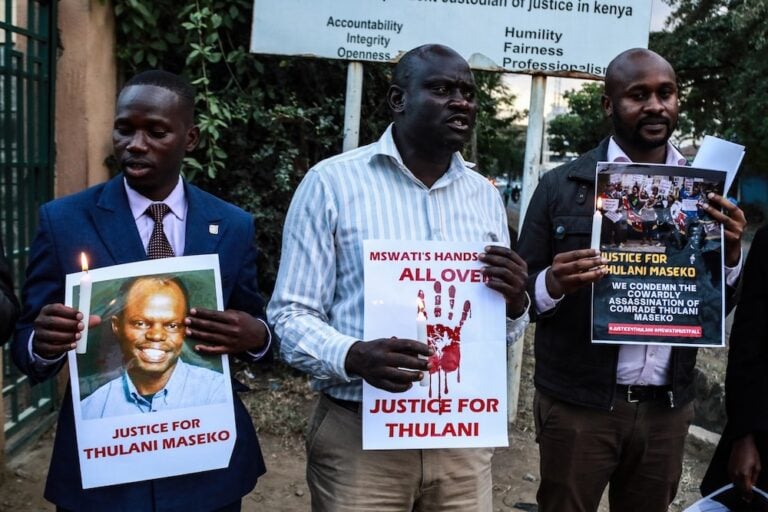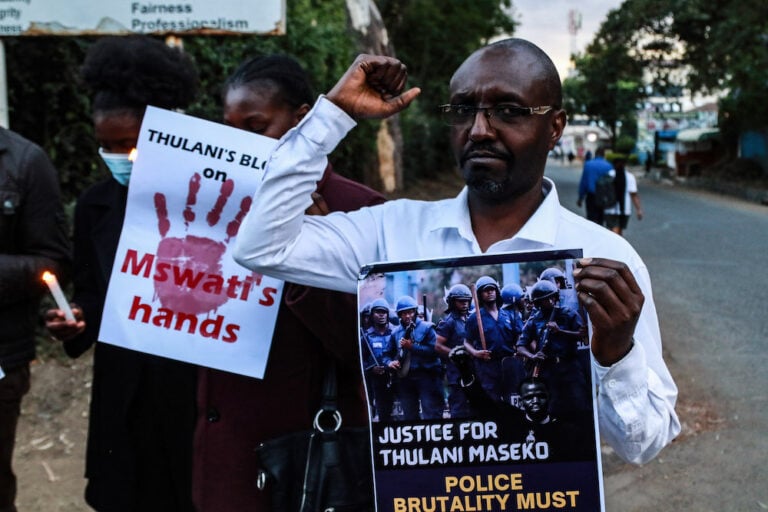(ARTICLE 19/IFEX) – ARTICLE 19 has expressed its concern at reports that the Swazi authorities intend to seek a court order forcing Bheki Makhubu, editor of the “Times Sunday” newspaper, to reveal his sources with regard to a story published on 12 September 1999 about the royal family. ARTICLE 19 is also concerned at reports […]
(ARTICLE 19/IFEX) – ARTICLE 19 has expressed its concern at reports that the
Swazi authorities intend to seek a court order forcing Bheki Makhubu, editor
of the “Times Sunday” newspaper, to reveal his sources with regard to a
story published on 12 September 1999 about the royal family. ARTICLE 19 is
also concerned at reports that, in response to this story, new legislation
on defamation is being rushed through parliament.
**Updates IFEX alert of 17 September 1999**
According to ARTICLE 19, the protection of journalists’ sources is
increasingly recognised as a crucial element of media freedom and of freedom
of expression and information generally. This growing recognition of the
confidential relationship between journalists and their sources of
information derives from an awareness of the role of the press in ensuring
freedom of expression and, in particular, as a public watchdog. The press
cannot effectively perform that function if people in possession of
information which they conscientiously believe should be brought into the
public domain are at risk of being identified and penalised for disclosing
it to the press. Many jurisdictions now provide some form of legal
recognition of the right of a journalist to keep his or her sources
confidential. For example, this right is protected by the present
Constitution in Mozambique.
ARTICLE 19 accepts that there may be countervailing factors in some
exceptional cases, such as where disclosure is necessary for compelling
reasons of justice or national security or relating to the prevention of
serious disorder or crime. But because freedom of expression and information
are of such fundamental importance to the protection of other basic rights,
it has been recognised that such exceptions should be narrowly drawn and
precisely defined and, in each individual case, subjected to the most
rigorous scrutiny by an independent and impartial tribunal. Such scrutiny
should give full weight, in ARTICLE 19’s view, to the potential detrimental
effects on the effective functioning of the press if disclosure is ordered.
In short, there should be full legal recognition of the confidential
relationship between journalists and their sources, which should be
overriden in only the most exceptional cases and for the most compelling
reasons.
ARTICLE 19 does not believe that the countervailing factors described above
which might justify compelling disclosure of a source apply with regard to
the story filed in the “Times Sunday”, however unwelcome its contents are to
the royal family or its supporters.
Recommended Action
Send appeals to the prime minister:
would compel Makhubu either to reveal his source or face possible
imprisonment
do not believe that good law can be made in a hurry
initiated and instead to undertake a properly considered review of the
existing law of defamation which would involve extensive and genuine public
consultations
Appeals To
Hon Sibusiso Dlamini
Prime Minister
Office of the Prime Minister
PO Box 395
Mbabane, Swaziland
Fax: +268 40 43 943 / 268 40 45 379
Please copy appeals to the source if possible.


